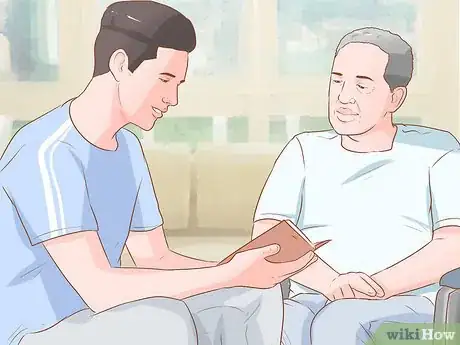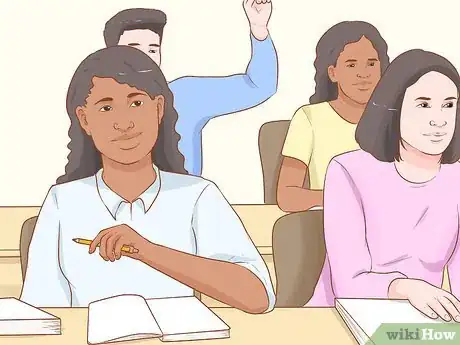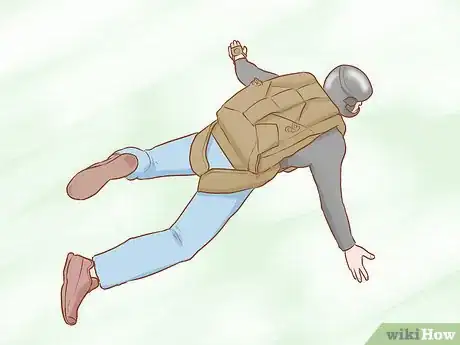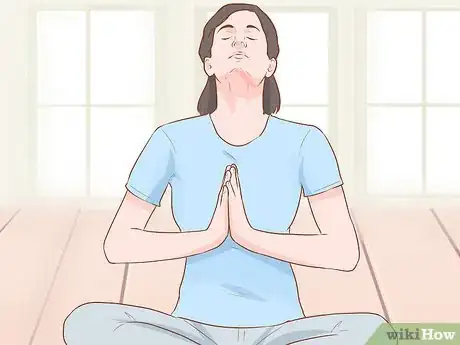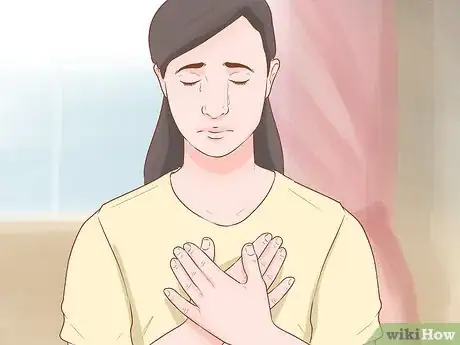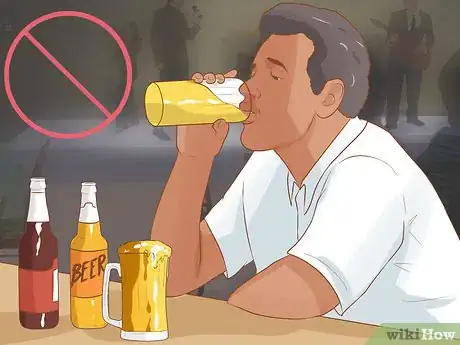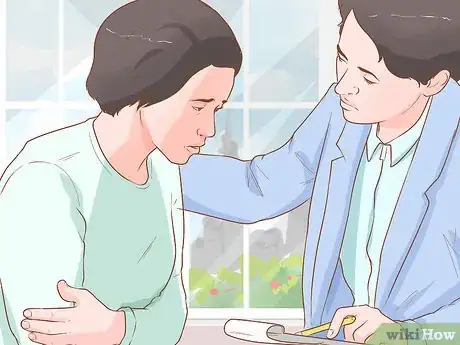This article was co-authored by Klare Heston, LCSW. Klare Heston is a Licensed Independent Clinical Social Worker based in Cleveland, Ohio. With experience in academic counseling and clinical supervision, Klare received her Master of Social Work from the Virginia Commonwealth University in 1983. She also holds a 2-Year Post-Graduate Certificate from the Gestalt Institute of Cleveland, as well as certification in Family Therapy, Supervision, Mediation, and Trauma Recovery and Treatment (EMDR).
This article has been viewed 11,125 times.
When you're sad, you may feel lost and unfocused. Staying busy can help you feel happier and less idle. Make sure that the things that you choose to keep you busy are less stressful and more enjoyable. Don't focus all your time on work, school, or care-giving, which could leave you emotionally drained and still feeling alone. Connecting with others is crucial to making you feel better. Do activities that enrich your mind and body. Accept that it's okay to feel sad from time to time, and make sure to allow yourself time for introspection.
Steps
Connecting with Others
-
1Spend time with friends and family. When you're sad, avoid isolating yourself. Make sure to connect with your friends and family regularly. That doesn't mean you need to host big parties, but rather be with people who are supportive and caring, even in smaller ways.[1]
- When you're feeling sad, reach out to a friend or family member by phone. Choose people who you think will be good listeners and provide reassurance.
- Ask friends to hang out after work or on the weekends. Invite a small group or just one good friend to do something fun.
- Visit with relatives more. There may be other family members who are going through a hard time too. Reach out to them.
-
2Join an activity club. Spending time with people who have common interests can help you feel less sad or alone. Think about the things that interest you personally. There may be clubs, social groups, or sports leagues available that you can join for free or low cost.
- Check out Meetup.com for groups and activities. There is often a diverse collection of activities available, and new people to meet.
- Identify clubs that may relate to your interests or background. Search online or check out community centers in your area. There may be runner's clubs or mom's clubs out there.
-
3Connect with people in your community. There are many people who feel socially isolated or wish they could be connected more to others in their community. Consider meeting up with a neighbor or reaching out to community centers about activities in your area.
- Meet up with an elderly neighbor who may also be feeling isolated or sad. Offer to help them or invite them over for dinner.
- Connect with your local place of worship. Churches and synagogues, for example, are places where people can feel safe to express their joy and their sadness. There may be a bible study group or another group that appeals to you.
- Go to your neighborhood community center or a YMCA for information about programs and activities. There are often many activities for people of all ages--kids, teens, adults, and older adults.
-
4Volunteer. Volunteering can be socially empowering and personally enriching. There are many organizations and non-profits that need volunteers. Identify places that may interest you, and connect with a volunteer coordinator for more information about how to help.[2]
- When you decide you'd like to volunteer, don't over commit yourself. Start with possibly helping out a few hours after work or school, or for part of a weekend.
- Some volunteer opportunities request regular volunteers, while others just to need volunteers during the holidays or for occasional events throughout the year.
- Consider choosing activities where you can directly connect with others such as after-school tutoring programs, volunteering at a hospital or retirement facility, or delivering meals through Meals on Wheels.
Enriching Your Mind and Body
-
1Take an educational or enrichment class. While going back to school for a degree may not be necessary or desirable, life enrichment and educational classes can help you feel productive. Classes provide regular structure over a few months, so that you're more accountable to keep up the activities or work. It can help to distract you from sadness or boredom.
- Search for classes at a local community college. Oftentimes it is easy to enroll in one or two classes for your own knowledge and interest.
- If you have an interest in the arts, there are often art centers or programs that offer short-term classes for the spring, summer, and fall.
- Consider online courses that could help to further your knowledge or career. You may find technical classes related to computers and design helpful for work or a future job.
-
2Be adventurous. When you're sad, you may feel stuck and unmotivated. Try to get out of your normal routine more often. This can help you to feel more confident and boost your spirits. Being adventurous can have different meanings for different people. You define what adventure looks like to you.
- Travel for a weekend getaway. You may find yourself happier and more relaxed when you're in the great outdoors or sipping drinks on the beach.
- Go to a new place to eat. Make new and different meals at home. Search for ingredients that aren't so typical. Try out new recipes.
- Do something a little outside of your comfort zone. Maybe you've always wanted to learn archery or go surfing. Schedule to take a class or learn more about what that activity would entail.
-
3Exercise regularly. Exercise can help boost your mood, and make you feel more energized. It doesn't mean that you need to hit the gym every day to help make yourself feel better. But, it's important to keep your body moving as it helps to reduce feelings of sadness and depression.[3]
- Take a walk outside. Go for a hike. Get outdoors for run or bike ride.
- Take a fitness class or dance lessons. Try a new workout routine.
- Schedule times to go to the gym. Consider having a workout buddy or getting a personal trainer.
-
4Devote time to a hobby or interest. Make time for things that interest you. They don't have to be costly or time-consuming, just fun and enjoyable. Set aside time after work, school, or taking care of the kids to do something for yourself. Prioritize this time for you, so that it's consistent rather than sporadic.
- Join a book club or read more for fun.
- Get crafty or artistic. Draw. Paint. Sculpt. Knit. Build things.
- Get involved with a local, intramural sports team through work, school, or in the community.
- Get geeky. Join a science or technology organization. Learn computer applications or programs. Find groups that are interested in comics, sci-fi, or fantasy games.
Allowing Time for Reflection
-
1Be more introspective. With modern technology and smart phones, it's easy to look busy at all times. When you put away your phone or sit somewhere feeling idle, you may be more connected to your actual thoughts and emotions. This can be at first unsettling, but it's actually a good thing. Try activities that help you stay in tune with your feelings so that you can have more control over them.[4]
- Consider doing meditation regularly. Even twenty minutes of meditation can help to clear your thoughts and feel more at peace.
- Write in a journal about what you're thinking or feeling. This can help to provide clarity about a situation or feeling.
- Try gentle yoga. This is a combination of stretching and mindfulness.
-
2Accept your feelings. While you may want to resist thinking about your sadness, loneliness, or grief, it's important to acknowledge that those feelings exist rather than deny them. Accept that feeling sad from time to time can be a part of life. It is a healthy response to things that may involve loss or grief. [5]
- Talk with someone you trust about your feelings of sadness. Communicating with others who are supportive can provide reassurance and boost your mood.
- Be present with your feelings. See them not as something that controls you, but rather a part of human existence.
- Having self-awareness about what is making you sad can also help you to focus more on activities that may actually benefit you, rather than masking your feelings with activities that do little to boost your mood.
-
3Avoid masking your sadness with mindless activities. Staying busy with activities that provide limited or no relief should be avoided. There are many ways that you can "pass the time," but you don't want to spend all your time doing things that make you feel bad or worse about yourself. Avoid these activities as a way to keep busy:
- Watching TV night after night. Spending time on the couch with limited social interaction.
- Mindless eating or snacking. Eating even when you're not hungry. Eating as a way to pass time.
- Using alcohol or drugs to make you feel better. This could lead to an unhealthy dependence if you are careless.
-
4Seek professional advice for persistent sadness, grief, or depression. While being sad from time to time is normal, pay attention to how long and how persistent this sadness is occurring. If you are feeling constantly sad every day for more than two weeks, seek help from a trained professional. They can help you understand your situation with greater clarity and provide treatment options.[6]
- Talk with a counselor about your feelings. There may be counselors or counseling centers in your area that take your insurance or provide assistance at low-cost. They can help you identify healthy ways to cope.
- Talk with your doctor if your sadness is impacting you both emotionally and physically. A healthcare provider can provide appropriate referrals or prescribe medication.
- Seek out support groups if there is a particular cause for your sadness, such as a recent death, divorce, loss, substance abuse issue, or other life event. Search online or in your community for support groups that may help you navigate these feelings.
- If you have any thoughts regarding self-harm, reach out immediately to an emergency hotline. In the US, you can call or text 988 to reach the 988 Suicide and Crisis Lifeline.
References
- ↑ https://www.nhs.uk/conditions/stress-anxiety-depression/feel-better-and-happy/
- ↑ https://www.betterhealth.vic.gov.au/health/HealthyLiving/its-okay-to-feel-sad
- ↑ https://www.nhs.uk/conditions/stress-anxiety-depression/feel-better-and-happy/
- ↑ https://www.nhs.uk/conditions/stress-anxiety-depression/mindfulness/
- ↑ https://au.reachout.com/articles/why-am-i-sad-all-the-time
- ↑ https://au.reachout.com/articles/why-am-i-sad-all-the-time



